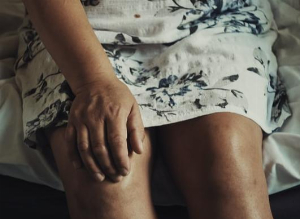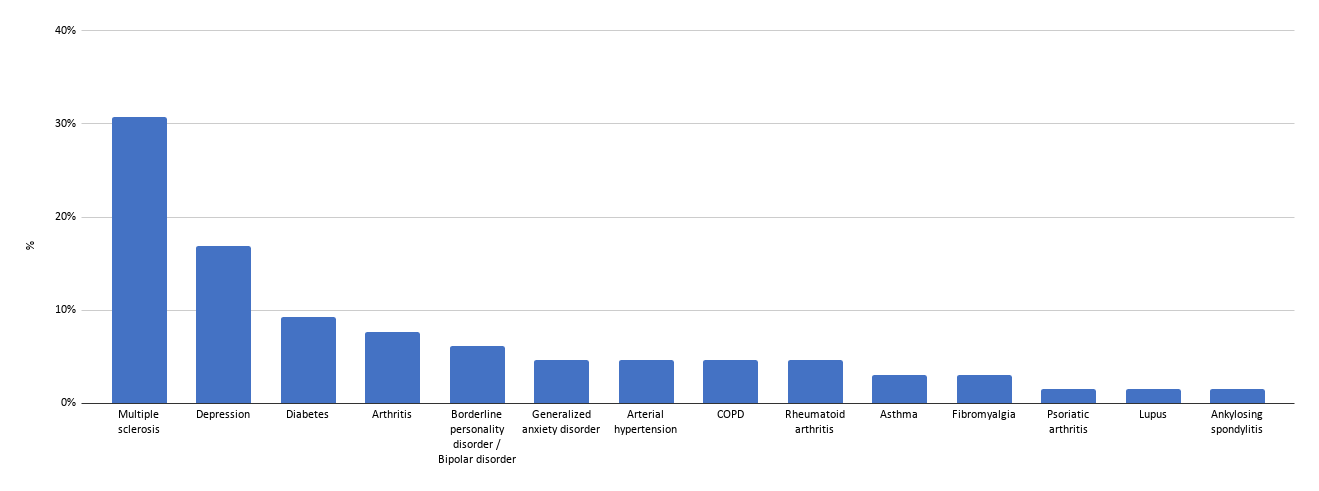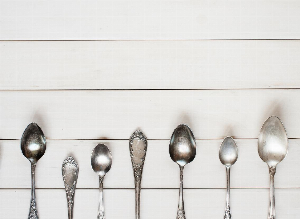How to take care of your joints? Carenity members share their advice!
Published Jan 28, 2021 • By Candice Salomé
Our lifestyle has a direct impact on the health of our joints. When suffering from chronic pain, it is important to take care of your joints. This means adopting good habits on a daily basis.
What are the daily habits to adopt? How can we take care of our joints?
We asked Carenity members about their daily habits for joint care.
We tell you everything in our article!

We conducted a survey from December 30 to January 15 in which 72 Carenity members participated. We asked them questions about how they care for their joints.
Respondents had the following chronic conditions:

To 5 good habits to remember!
Exercise:
Exercise has long been put aside for fear of increasing pain. However, physical activity helps maintain good joint health. Using your joints allows you to flush bad toxins, to maintain your muscle tone, but also to maintain a healthy weight, meaning that the joints don't have to carry excess weight which can put them under stress.
18% of respondents exercise regularly.
It is important to choose a type of physical activity that suits one's desires and physical abilities.
Some of the sports preferred by respondents are:
Pilates | yoga | elliptical trainer | walking | cycling | soft gym | stretching | swimming | strengthening exercises
All of these activities allow for gentle and non-aggressive stress on the joints.
Adopt a healthy and balanced diet:
It is essential to change eating habits when subject to joint pain. Indeed, processed foods tend to increase the rate of inflammation in the body (this is a triggering factor for osteoarthritis). A healthy and balanced diet that is good for our joints should include:
- Protein: Muscle loss tends to increase with age. Our skeleton needs muscles to hold itself up and avoid joint stress, falls and fractures, for example. The recommended protein intake for an adult is 0.36 grams of protein per pound of body weight, but this figure increases to 1 gram per pound of body weight in elderly people. It is therefore important to consume vegetable and animal proteins.
Our respondents' favorite sources of proteins are: white meat, legumes, fish and eggs. - Omega-3s: They are essential to the proper functioning of our cells and have anti-inflammatory properties. They are called 'essential fatty acids', though the human body cannot create them on its own.
Our respondents are aware of this fact and eat Omega-3s every day. They can be found in: fatty fish (salmon, mackerel, sardines, tuna, etc.), certain vegetable oils (soybean oil, hazelnut oil, canola oil, etc.), cod liver oil, oilseeds (walnuts, hazelnuts, almonds, etc.), avocado, spinach, watercress, etc. - Calcium: Our bones are in constant renewal and lose their main constituent, calcium, every day. To prevent the skeleton from becoming brittle, it is essential to replenish it with calcium constantly. Dairy products are key foods to eat every day because their calcium is well absorbed by the body.
Many of our respondents consume two yogurts or two portions of cheese every day.
Use dietary supplements:
31% of respondent use dietary supplements
Nature, as a matter of fact, has many properties that can help fight joint pain. Meadowsweet (also called mead wort), white willow bark and red berries are packed with antioxidants that help reduce the pain. They can be taken as dietary supplements to combat inflammation or help cartilage regeneration (when they contain chondroitin and glucosamine).
Turmeric also has many virtues. Its benefits are even recognized by the WHO, which states that "the anti-inflammatory effect of turmeric is due to its richness in curcumin, a substance that can capture free radicals". This spice therefore protects cells from premature aging and contributes to good muscle health.
Keep yourself hydrated:
Composed mainly of cartilage, joints are made of 75% water. It is therefore essential to get into the habit of staying well hydrated. It is recommended to vary the water you drink, giving preference to ionized water with a higher pH. These waters are rich in benefits and can help fight against the body's acidity.
Most respondents drink about 1 liter of water per day, while others admit to not drinking enough. Some consume more than 2 liters of water per day. The majority of respondents say they drink tap water.
Practice self massage:
27% of respondents practice self massage
It is important to take the time to massage yourself regularly, for a moment self-care and to take care of your joints. Massage helps to stimulate different body mechanisms and keep joints supple and healthy.
The members who responded to the survey mainly use essential oils (peppermint, lavender, wintergreen), argan oil, tiger balm or anti-inflammatory ointments.
In conclusion, to help take care of your joints, make sure to implement these 5 healthy habits in your daily routine, as other Carenity members do!
Was this article helpful to you?
Share your thoughts and questions with the community in the comments below!
Take care!
Sources:
- Study carried out from December 30th to January 15th with 72 Carenity members.
- Le Curcuma, la plante des articulations, Arkopharma Laboratoires
- Prendre soin de ses articulations à tout âge, Weleda
- Méthodes naturelles pour prendre soin de ses articulations, Plantes et Santé
Comments
You will also like

Spoon theory: What is it and how can it help people living with chronic illness?
Apr 13, 2022 • 7 comments

What is the psychological impact of chronic pain? Carenity members share their experience!
May 27, 2021 • 8 comments

 Facebook
Facebook Twitter
Twitter
